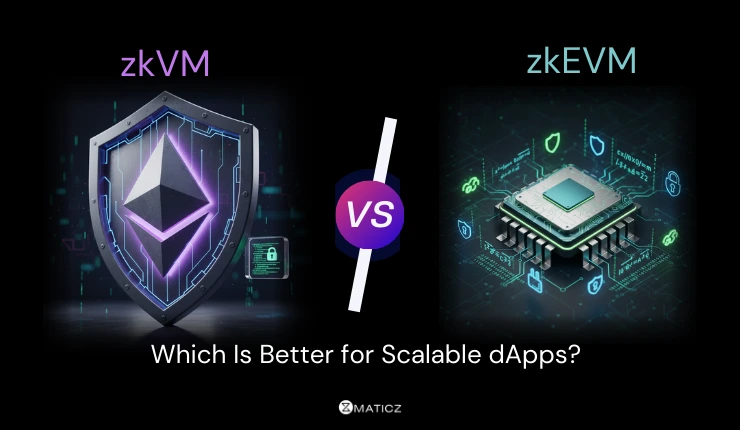Share Posts

What is the Difference Between Custodial and Non-Custodial Wallets?
46
1850
103
The rise of cryptocurrencies has brought an unprecedented transformation to the financial landscape over the years. The adoption of cryptos has resulted in the invention of a wide array of new cryptocurrencies. Crypto investors are looking to interact with crypto assets owing to the opportunities they offer in the financial ecosystem.
Given this, crypto users come up with the question of "How do you store crypto assets?" Here is where the crypto wallets come into play. The crypto wallets are now beyond a digital asset management tool, which has turned out to be a multi-functional platform that aids users to seamlessly store, manage, and trade cryptocurrencies.
The crypto wallets are broadly classified into two types: the custodial and non-custodial wallets. Both the wallets serve the purpose of securing the digital assets, but differ in certain aspects. In the blog, let's dig deeper into the types of crypto wallets and the differences between them to make a better choice of crypto wallet.
What is a Custodial Wallet?
Custodial wallets are a type of cryptocurrency wallet where a third party takes custody of the private keys on behalf of the user and takes full control over the user's digital assets. This means that the third party is responsible for managing the private keys and protecting the assets, and facilitating transactions. Mostly, users rely on custodial wallets when they find it difficult to manage their private keys.
The private key is nothing but a digital code that serves as a password when users access their crypto wallets. Losing the private key results in losing access to the crypto assets. Hence, most users prefer using custodial wallets to avoid the risk of crypto asset loss. Binance, Coinbase, Free wallet, BitMex, Bitgo, etc, are some of the examples of custodial wallets.
Pros and Cons of Custodial Wallet
Custodial wallets offer several pros however, they come with certain cons. Take a closer look at the pros and cons of the custodial wallet.
Pros of Custodial Wallet
Ease of Use
The custodial wallets are known for ease of use and convenience. These wallets can be easily set up and start transactions, and they need not worry about private key management since the wallet takes charge of that.
Backup and Recovery
Custodial wallets offer a high backup and recovery facility since they are centralized. Hence, users can retrieve their passwords easily, and this type of wallet is highly suitable for novice crypto traders.
Free Transactions
The custodial wallets offer free or very low fees for users to transact with other users within the same platform. This makes it the best choice for users to transact without any fees.
Better Security
The custodial wallets offer greater security for the users by employing advanced security protocols like multi-factor authentication, encryption, etc. Hence, the risk of malicious attack or data breaches is low in the custodial wallet.
Cons of Custodial Wallet
Lack of Full Control
The major disadvantage of the custodial wallet is the lack of full control for the users. Since the wallet controls the private keys, the users have to rely on the central authority to access the crypto wallet.
Privacy Risks
Using a custodial wallet reduces the anonymity of users in the crypto space. Since these wallets follow the KYC and AML protocols, the users have to provide their identity to the wallet.
Limited Access
The custodial wallets may limit access to the users when there a technical issues. This may also end up in freezing the account, where the users will be restricted from accessing their funds.
No Offline Support
The custodial wallet does not offer offline support since it relies on a centralized authority. The users are capable of making transactions only with an internet connection.
What is a Non-Custodial Wallet?
A non-custodial wallet is a type of crypto wallet that gives full access to users over their private keys. This means that the users gain complete ownership over their assets and eliminate the need for intermediaries to store and manage the private keys and the crypto funds. The users should set up a recovery phrase, which is also known as a seed phrase, that serves as the key to access their crypto assets.
Users who prioritize security and data privacy mostly opt for non-custodial wallets. The types of hardware wallets include browser-based wallets, hardware wallets, paper wallets, etc. Since the non-custodial wallet eliminates the mediators, the user is solely responsible for protecting the private key and the seed phrase. These types of wallets offer greater transparency and control over the transactions for the users.
Pros and Cons of Non-Custodial Wallet
The non-custodial wallet is the most opted type of wallet owing to the complete access and control it offers to the users. Let's see the pros and cons of using a non-custodial wallet.
Pros of Non-Custodial Wallet
Control Over the Assets
The benefit of a non-custodial wallet is that it offers complete control to the users, and there are no central authorities involved in managing the assets and transactions.
Cold Storage Facility
The non-custodial wallets offer a cold storage facility, which means the private keys are stored offline, which aids in offering enhanced security, eliminating the risk of hacks.
Instant Withdrawal
The non-custodial wallets facilitate instant withdrawals since it does not ask for permissions from the central party. This helps the users to simplify the transaction process.
Enhanced Security
The primary advantages of a non-custodial wallet is that it offers greater security for the users, as they have more control over the private keys, and the wallet also offers cold storage functionality.
Cons of Non-Custodial Wallet
More Responsibility
In non-custodial wallets, the users have more responsibility over securing their private keys. A minor error might lead to unforeseen issues, which might be difficult to resolve.
No Customer Support
The risk in the non-custodial wallet is that it does not offer customer support like a custodial wallet. Hence, if the crypto assets are lost, the users will find it challenging to recover.
Complex User Interface
The user interface of the non-custodial wallet is complex compared to the custodial wallet. Hence, the beginner crypto users will face difficulty in understanding the wallet.
Custodial vs Non-Custodial Wallet: What is the Difference?
Take a look at the breakdown of the difference between the custodial and non-custodial wallet. This aids users in choosing the right crypto wallet according to their preferences.
Ownership of the Private Key
The major difference between a custodial and a non-custodial wallet is who owns the private keys. In a custodial wallet, the third party takes custody of the private key, whereas in a non-custodial wallet, the users take ownership of the private keys without the interference of any intermediaries. Hence, entrepreneurs who have concerns over their privacy can opt for the non-custodial wallet.
Security
The security in a custodial wallet is lower compared to a non-custodial wallet. In the custodial wallets, the assets are stored online with the use of an internet connection, which might have the risk of data breaches and hacker intrusion. In contrast, the non-custodial wallet offers a cold storage facility, which aids users in storing their funds offline, fostering greater security.
Backup and Recovery
When it comes to backup and recovery functionality, the custodial wallet helps better in recovery when the private keys are lost, since the users rely on the central party. On the contrary, in non-custodial wallets, the users have the authority and control over the private key, which might make it difficult to get back the keys if they are lost.
Transaction Time
The transaction process is simpler in non-custodial wallets since they do not have to gain authorization from any mediator to process the transactions and can interact directly with the blockchain network. On the other hand, the transaction process is a little longer in the custodial wallet since the users have to gain confirmation from the middlemen to transact.
Customer Support
When it comes to customer support, the custodial wallet helps users with instant support through live chats when there is any technical issue. On the contrary, the customer support is limited in non-custodial wallets, and if the funds are lost, it is lost and there is no going back.
Ease of Use
The custodial wallets are beginner-friendly and convenient to use. The users need not worry about the technical aspects, as they are handled by the third party. On the other hand, the non-custodial wallets are a little complex and will be overwhelming to interact with since it takes time to understand the features and functionalities.
Final Thoughts
In conclusion, both custodial and non-custodial wallets have unique functionalities and benefits for the users according to their goals. Now, the users end up on which wallet to choose. It is pivotal for the users to gain a deep understanding of both wallets to get a clear idea of which to opt for. Given this, the choice between the two wallets solely depends on the priorities of the users, such as ownership, privacy, security, convenience, customer support, etc.
Understanding the difference between wallets will help users choose a wallet that fits perfectly with their preferences and requirements. Users who look for convenience, customer support, backup, and recovery can go with the custodial wallet. Whereas for users who prioritize complete ownership, an offline facility, a non-custodial wallet will be an ideal choice.
Are you a business that is looking to start a crypto journey by launching a cryptocurrency wallet? Partner with Maticz, the industry-leading crypto wallet development company that offers trailblazing crypto wallet solutions that aid in building impeccable crypto wallet platforms. Our technical prowess has a deeper understanding of the blockchain landscape, and hence craft crypto wallets leveraging the perfect tech stack. We prioritize integrating modern security protocols to give greater security to your crypto assets.
Tap Into the Future
The latest insights, posts, and project updates - straight to your inbox.




